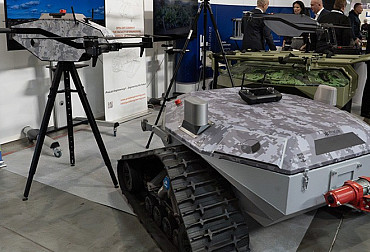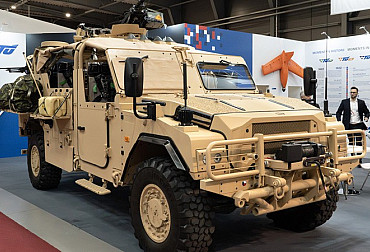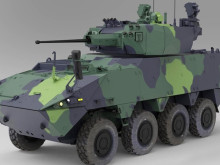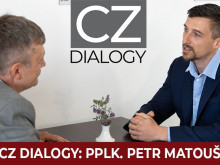Petr Sklenář: The importance of the arms industry will continue to grow
The performance of the Czech armaments industry is not only determined by its production capacity or the ability to procure increased quantities of necessary materials; an important factor is the functioning of the banking sector, which enables business entities to conduct standard business using common financial operations such as payments or credit. Unfortunately, the internal rules of individual banks make this otherwise quite common practice impossible. The so-called ESG taxonomy, which classifies the defence industry as a socially unsustainable industry, is to blame. While the situation in Ukraine has forced the European Commission to rethink this policy, the current reality is still based on individual skill, size and corporate pressure on the respective banking houses. But the issue is much broader than that. We discussed not only the difficulties of armament manufacturers, but also the concepts of national defence, economic instruments of the state and the strength of the arms industry in the next episode of our discussion programme CZ DIALOGY with J&T Bank's chief economist Petr Sklenář.
Video: Interview with Petr Sklenář, Chief Economist of J&T Bank / CZ DEFENCE
For an economist, national defence is a concept that can be viewed from two perspectives. The first one is based on political economy: "It is one of the defining features of the state. It is actually a definition of the national priorities of the existence of the state, the fulfillment of the functions of the state and the provision of the needs that the state can give to its citizens with all the benefits that this brings," says Petr Sklenář, who adds that the second point of view is purely economic. "National defence is an ideal public good where its consumption is indivisible and non-rivalrous. This means that when the state provides public defence, we both receive it equally. And the fact that I consume it is not at your expense. Which is different from other public goods that the state provides," explains Sklenář. The 30-year history of the Czech Republic unfortunately reflects a European trend known as the peace dividend. "This means that building up a defence army in Europe is simply an outdated idea and that we should not spend taxpayers' money on these goods, that it is more effective to give it to something else. But at least the last year has provided a demonstration that that view is false. It is linked to the basic function of the state," says Sklenář, warning that if we resign ourselves to this moment, then we resign ourselves to the state as such.
A good example of the transformation of this perception is the emergence and course of the Russian-Ukrainian war. "The first thing was that not only in the Czech Republic, but in Europe in general, there was a steady decline in defence spending, to the point where governments pretended that the army was some kind of a relic that we were dragging along and would continue to finance for some time to come," Sklenář says, adding that this was related to the approach to investment and financing. "What has been happening over the last year is a dramatic change and realignment of the whole paradigm of how we are supposed to operate over the next decade. So far, it's at a stage, I would say, like leaven dough. On the one hand, governments are committing to significantly increasing defence spending. They see it as part of their desire to play a bigger role, which is even more visible for us in the case of Poland," says Sklenář. Minimum requirements are being raised and according to Petr Sklenář there is a renaissance of the arms industry not only in the West but also on a global level. "And the second thing is that some of the negative attitudes towards the arms industry are still not lost here, because paradoxically, at the moment of the start of the war in Ukraine, the EU officially started the process of establishing a social taxonomy, where it is still stipulated that arms production can be considered socially unacceptable or socially harmful, as production that should be eliminated from the economy," explains J&T Bank's chief economist Petr Sklenář.
"And here it would also be important to note that we look at the arms industry in a somewhat narrow way. There are a number of companies that work in the arms industry and have contracts for both the military and the civilian sector," Sklenář says, adding: "The annual export of arms production in our country is at the level of CZK 20 billion a year, which is about half a percent of total exports. In comparison, the export of cars per month is 40 billion. On the other hand, there has been a great renaissance, as the volume has roughly quadrupled in the last 10-15 years." In general, according to Petr Sklenář, the arms industry has not been treated well in the previous 25 years. It can be called a decline, a survival. In the last year, however, there has been a dramatic renaissance. "We have companies that provide purely military production. And it doesn't matter whether it is companies that provide weapons like Czech Armaments or equipment like Prabos, or even companies that were created completely out of thin air, for example Primoco, which provides unmanned aerial vehicles that were primarily intended for use in the civilian sector. But the change that has been taking place over the last year has, of course, also brought orders from the arms industry or from armies. The company that started on a greenfield site now has annual revenues of around half a billion euros," Sklenář points out. This period has not only brought with it a renaissance of the Czech arms industry, but also its expansion abroad. "For example, Czech Armaments, which bought the American Colt, and CSG bought a small-calibre ammunition manufacturer in Italy. So it can be seen that there was, let's say, already a renaissance of the arms industry in Ukraine before the war. And today I would say that we are reaching a completely different level," says Petr Sklenář.
 Picture: In this episode of our discussion show CZ DIALOGY, we talked to J&T Bank's Chief Economist Petr Sklenář | Michal Pivoňka / CZ DEFENCE
Picture: In this episode of our discussion show CZ DIALOGY, we talked to J&T Bank's Chief Economist Petr Sklenář | Michal Pivoňka / CZ DEFENCE
The expansion of Czech armourers abroad is certainly an interesting trend. But is it not a gradual exit from the European market and a move to safer destinations? "It is forced. The first thing is that we previously had a Czech government that had no need to arm the army sufficiently. Then we have the capacity of the arms industry here and we are a relatively small open economy that is dependent on exports. We export a large part of our industrial production. So from that point of view, I am not surprised by the ratio. One would expect, given the change in the priorities of the Czech government towards the Czech army, that orders for domestic use will increase. And it won't just be about exports. The second thing is that there is a great demand everywhere in Europe, almost everywhere in the northern hemisphere, which is an opportunity for us to position ourselves in this field as well. And the importance of the arms industry will very likely continue to grow," estimates economist Sklenář.
Nevertheless, especially in these unstable times, it should be crucial for manufacturers to have everything at hand. According to Petr Sklenář, this is a broader problem, caused, among other things, by covid and what followed afterwards, the so-called deglobalisation, when companies started to realise that it is necessary not only to have the cheapest production, but also to have simplicity and stability in the supply chain, i.e. they try to shorten it to make it stronger. Some of the supplies are being shipped by companies from the other side of the world, for example from South East Asia to Europe or to the Balkans or close to Europe. "It is not just the arms industry, but the industry as a whole. What's the other thing is that for the last year and a half, geopolitics has come into it. This means that it is also important to know exactly where the supplies are coming from. So that it is, let's say, a friendly country. For example, what is being dealt with today as the most difficult point of assistance to Ukraine is artillery ammunition. We have the capacity to produce it, but we do not have enough raw materials to fill all the production capacity. And one of those problems is that some of those components - I think cotton - are imported from post-Soviet republics and from China. That means that we are dependent on those supplies. It's the same with pulp. It is actually reaping a peace dividend, on the other hand, underinvestment along the whole chain," points out economist Petr Sklenář.
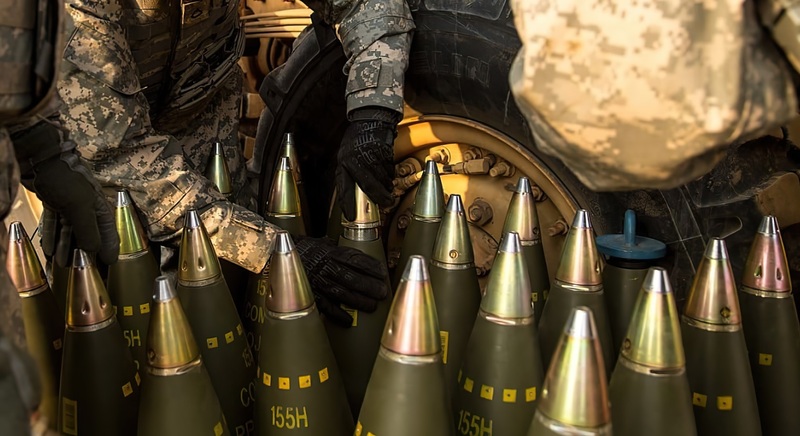 Picture: Today, the most difficult point of aid to Ukraine is artillery ammunition. (illustration photo) | U.S. Army
Picture: Today, the most difficult point of aid to Ukraine is artillery ammunition. (illustration photo) | U.S. Army
The need to modernise armies and the associated increase in arms production brings with it the need to find financial resources. For example, a defence fund has been set up in neighbouring Germany. In addition to the 2% of GDP spent on defence, this fund will accumulate resources for the rapid acquisition of equipment and the rapid re-establishment of the readiness and combat level of the army. "In this respect, I would commend Germany for defining everything clearly and looking for the most effective ways. It has said that it has a grossly dysfunctional military in terms of combat capability - almost two-thirds of its military helicopters are not capable of combat deployment. For aircraft, it has not been much better. And about a third of the combat equipment and vehicle equipment is in a similar state. And so, in addition to increasing defence spending, Germany said it would set up a special fund, where it would put €100 billion a year (for five years, editor's note), to bring the army back to a combat-ready level. In addition, the Germans are continuing to increase conventional defence spending, which is in the order of sixty billion euros. The aim is to equip technology regardless of other things. That makes sense to me, the objective and its use is clearly stated, then it can work through the fund and it is then more effective. In general, the army should have a similar fund, but it is necessary to set priorities, what I want to achieve and where I want to get to, because the Germans said, we want to have an army at some level in five years and then continue with it," concludes economist Petr Sklenář.
If you want to know how the European Union feels about the taxonomy, whether and how the Czech Republic will meet the 2% of GDP defence spending, how much of this money will stay here in the Czech Republic, what is the situation with the ability of Czech companies to engage in industrial cooperation and whether this is a realistic requirement in terms of procurement, listen to the full interview with J&T Bank's chief economist Petr Sklenář at the beginning of this article.















